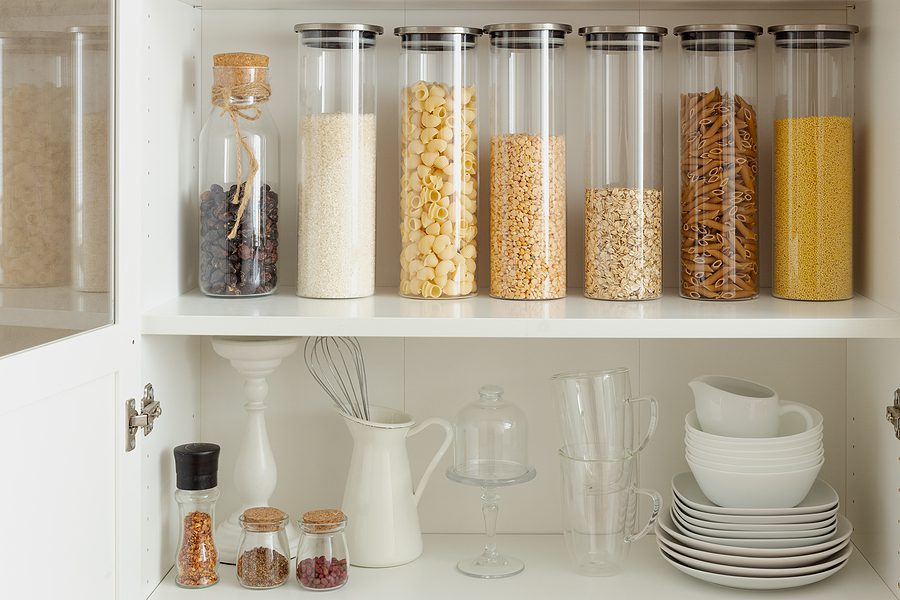Every household has a ready supply of everyday food items in their kitchen. Pantry staples, whether in your or your loved one’s home need a good going over every now and then to check on whether the item should be kept or thrown away.
According to a January 2023 article in the New York Times, best-by dates are not always expiration dates. This may seem odd, but they are voluntary dates that have nothing to do with safety. Manufacturers take a guess as to when they think the product will no longer be at its peak quality. Depending on the product, it may still be safe to eat long after this date. As a precaution, they tend to be conservative with these dates. Here are the pantry staples we all have in our homes with a quick guide as to how long we can keep the item.
Flour
White flour, such as all-purpose lasts about 1 year. Double the shelf-life by storing it in the freezer. This applies to white rice also. Whole-wheat and other whole-grain flours last 3 to 6 months as well as brown rice. They all contain fats that can go rancid in the pantry.
Pantry Storage for Bread
Generally, supermarket bread contains oils and preservatives. They can stay in the fridge for weeks and stay soft. On the other hand, bakery bread will only be fresh for one day. But it can be sliced and placed in the freezer to use daily.
Pantry Stores of Beans & Lentils
Beans and lentils are almost always safe. However, they will take longer to cook and be tougher as they age. Don’t cook them with acidic ingredients which will also increase cooking time.
Spices
Everyone has some strange spice needed once for a new recipe and never used again. They are still fine to use, but with decreased potency. On average, a spice loses peak potency 6 months after opening. But as long as they are stored in a dark, dry environment, such as a spice pantry, they will stay fresh enough for use
Canned & Jarred Foods in the Pantry
Canned items will stay for years as long as there are no visible signs of spoilage. These may include a bulging can, rust, or signs of spoiling when opened. A can of soda can be fizzy for years. The little button on top of a jar is the best way to tell if the contents are OK to eat. They can last up to a decade if stored properly.
Oils
When stored in sealed cans will last virtually forever. Do not keep near heat, but in a cool dry place. Use your nose to see if there is a foul odor or if the oil is tacky instead of smooth between your fingers to test if it is still good.
Condiments
Mustard lasts forever, Ketchup will still be fine even when it turns a darker color. Mayonnaise has a long shelf life.
Eggs
Properly stored, eggs hardly ever go bad. The sell-by stamp is up to 60 days after the egg was laid. If the egg smells rotten or sulfurous, toss it.
Milk
In order to ensure longer shelf life, look for organic products that undergo “UHT- Ultra-high temperature.” This ensures the product will last longer.
Baby Food in the Pantry
Federally mandated use-by dates, which represent the latest date the manufacturer can guarantee not less of each nutrient printed on the label. Baby food can vary wildly, as some have fewer preservatives than others. for the safety of your child, it is best to follow these dates to the best of your ability.
We all have accumulated items in our pantries and refrigerator as we stocked up during the time of COVID. Now is the best time to sort through these items to create a well-balanced kitchen that is safe, healthy, and especially tasty!
Safe Harbor Healthcare Services does not provide medical, healthcare, or financial advice via articles. This material has been prepared for informational purposes only. It is not intended to provide, and should not be relied on for medical advice.
Safe Harbor Healthcare Services has been providing excellent home care on Staten Island since 1967. Our services help the elderly and disabled live safely and independently; while giving their families the peace of mind they need. For more information contact us by clicking here, or by calling (718)-979-6900.

